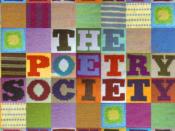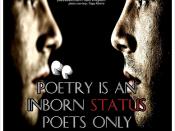In this poem, Roger McGough presents metaphorically the difficult life of a modern-day poet, his attempt to appeal to the public his work whilst also managing to please the critics.
The poem opens with McGough asking a ÃÂdoctorÃÂ for his opinion on a recently written poem. This ÃÂdoctorÃÂ or ÃÂpublisher/criticÃÂ, as we would assume in a non-poetic sense, goes on to ÃÂstab a cold finger into the poemÃÂs heartÃÂ- which suggest metaphorically that this ÃÂsurgeonÃÂ is dissecting McGoughÃÂs work. This is well illustrated, for in reality, McGoughÃÂs life; his future as a poet, is in this ÃÂpublisherÃÂs hands. Furthermore, in using such a sinister overtone he describes the criticÃÂs cold, analytical nature. It is in this period of the examination of his poem that he reveals the first signs of stress and anxiety, evident by McGoughÃÂs portrayal of the clock ticking ÃÂnervouslyÃÂ and the fact that his ÃÂpalmsÃÂ began to ÃÂsweat.
Much like a doctor being unable to cure an illness and save oneÃÂs life, this publisher is unable to accept the written poem, thus triggering McGoughÃÂs road to death.
The poem (as stated before), generally describes the difficult life of a modern-day poet, whose potential for success has been considerably hindered over the past 100 years, with other forms of entertainment such as television, recorded music, and radio having taken up some of the spotlight. He states in the third stanza that he ÃÂwas to remain one of the all-time great unknown poetsÃÂ, which is an obvious implementation of irony- for he is but one of many poets who have tried and failed in their quest for recognition in the world of entertainment. Regardless, this is unfortunate for McGough, for his poetry is an integral part of him. A line where this is shown is in the second stanza where he ÃÂbuttons up his manuscriptÃÂ and leaves. Like buttoning up a shirt or jacket, this manuscript, this poetry, is what he wears to help him shield himself in the world. It is after all this coming to terms with his failure as a poet in succeeding in a world of impossible-to-please critics that he decides to ÃÂend it allÃÂ.
Within the poem, McGough uses poetic terminology such as ÃÂodesÃÂ and ÃÂstanzasÃÂ (To replace ÃÂcats and dogsÃÂ) and ÃÂcatching a crowded anthologyÃÂ (a tram or train perhaps) to more vividly describe the poetic life around him; that he sees the world as a poem. This impressive literary display of using poetic terms to represent, metaphorically, real-life objects is employed to great extent in the fourth and final stanza, where illustrated is McGoughÃÂs suicidal attempt to appeal to, if not the critics, the people his poetic genius by compromising his poetic integrity and ÃÂtaking an overdose of lyricismÃÂ. Following his ÃÂwaitingÃÂ of the ÃÂfinal peaceÃÂ is the bursting into the room of the ÃÂVerse SquadÃÂ, which is followed by the ÃÂPoetry PoliceÃÂ (there to arrest McGough for his appalling, criminal act of trying to show to the people; the world, his poetry). The irony here is that while the critics are happy for poets to try and fail to seek critical recognition, to actively seek public recognition is seen as completely unacceptable.
In this rather unique poem, Roger McGough has illustrated cleverly that it is very difficult in the life of a poet, or for any entertainer of that matter, to succeed in the modern world where one must both endure and overcome the apathy and criticisms of society.
NO external sources were used in the construction of this essay.





